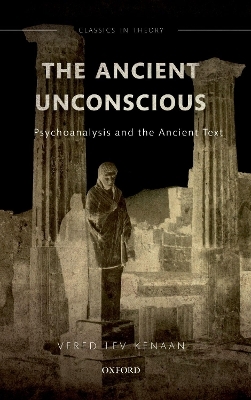
The Ancient Unconscious
Oxford University Press (Verlag)
978-0-19-886687-9 (ISBN)
In the field of classical studies, the psychoanalytic construction of the unconscious is rarely regarded as a fruitful methodological concept. Commonly understood as a modern conceptual invention rather than the discovery of a psychic reality, the notion of the unconscious is often criticized as an anachronistic lens, one that ineluctably subjects ancient experience to modern patterns of thought.
The Ancient Unconscious seeks to challenge this ambivalent theoretical disposition toward the psychoanalytic concept and reclaim the value of the unconscious as a methodological tool for the study of ancient texts by transforming our understanding of what the unconscious means, the way it operates, and how it relates to textual hermeneutics. It considers the debate over whether the ancients had an unconscious as an invitation to rethink the relationship between antiquity and modernity, investigating the meaning of textuality through contact between historical moments that have no priority under the law of chronology: associations and connections between the past and its future - including the present - belong to the sphere of the unconscious, which is primarily employed here in order to study the inherent, often hidden, links that bind modernity to classical antiquity and modern to ancient experiences.
Drawing on an incisive examination of the complicated, often conflicted, relationship between classical studies and psychoanalytic theory, the volume aims to explain why the concept of the unconscious is in fact inseparable from, and crucial for, the study of the ancient text and, more generally, the methodology of classical philology.
Vered Lev Kenaan is Professor of Classics and Comparative Literature at the University of Haifa. As an interpreter of culture and myths, her writing centres on the relationships between psychoanalysis and literature, intertextuality and the interpretation of dreams, textuality and gender: her book, Pandora's Senses: The Feminine Character of the Ancient Text (Wisconsin, 2008) interprets the myth of the first woman and shows how femininity is embedded in canonical texts reflecting male hegemony. Her investigations of Greek and Roman mythology led to the creation of a series of public lectures at the University of Haifa dedicated to the contribution of myth to the humanities, the arts, and the social sciences. She is the chief editor of a book series 'Myth in the Humanities' published by Haifa University Press and Pardes Publishing House, and is also editor of the journal Dappim: Research in Literature.
Frontmatter
List of Illustrations
0: Introduction
1: The Ancient Unconscious? Towards a Methodology
1.1: Philology's Complexes
1.2: Facing Ancient Experience
1.3: Psychologizing the Ancients: The Case of E. R. Dodds
1.4: The Unconscious and Gadamer's Fusion of Times
1.5: Anachronism as a New Philological Project
1.6: Antiquity and Modernity: The Familiar Strangers
2: Hegel's Antiquity: Far Away, So Close
2.1: The Past: Buried and Unburied
2.2: Antiquity: A Fountainhead of Ambiguities
2.3: Self-Estrangement
2.4: Golden Apples in Silver Bowls
2.5: Antiquity as Mother-Earth
2.6: The Antaeus Complex
2.7: Veiled Antiquity
3: Freud on the Acropolis
3.1: From Hegel's Antaeus to Freud's Oedipus
3.2: The Death of the Father and the Reawakened Past
3.3: A View from the Acropolis
3.4: parvis componere magna
3.5: The Future Unveiling of Tityrus' Unconscious
3.6: Virgil's Unveiling of Freud's Unconscious
4: Childhood Memories: Homeric Digression and Freudian Regression
4.1: Freud's alte Zeiten
4.2: From Mythic to Psychological Memory
4.3: Memory as a Digression
4.4: Remembering and Forgetting
4.5: (Where on earth are they?)
4.6: The Return of the Primordial Washing Scene
4.7: The Scar and the Dream Navel
5: The Unconscious as a Figura Futurorum
5.1: From Universalism to a Theory of Analogies
5.2: Linkings
5.3: Temporalities
6: Oedipal Dreams: The Ancient and Modern Unconscious
6.1: Dreaming about Oedipus
6.2: The Unconscious at the Crossroads
6.3: The Oedipal Dream: Backwards and Forwards
6.4: The Future of Dreams
6.5: Past Translated into Future
6.6: Disguised and Undisguised Oedipal Dreams
6.7: Asexual Oedipal Dreams: An Ancient Case of Repression?
6.8: Artemidorus' Unconscious
6.9: The Sexual Mother
6.10: Aeneas' Oedipal Dream
Endmatter
Bibliography
Index
| Erscheinungsdatum | 01.09.2021 |
|---|---|
| Zusatzinfo | 2 black-and-white illustrations |
| Verlagsort | Oxford |
| Sprache | englisch |
| Maße | 137 x 215 mm |
| Gewicht | 314 g |
| Themenwelt | Geisteswissenschaften ► Psychologie ► Psychoanalyse / Tiefenpsychologie |
| Geisteswissenschaften ► Sprach- / Literaturwissenschaft ► Anglistik / Amerikanistik | |
| Geisteswissenschaften ► Sprach- / Literaturwissenschaft ► Literaturwissenschaft | |
| ISBN-10 | 0-19-886687-9 / 0198866879 |
| ISBN-13 | 978-0-19-886687-9 / 9780198866879 |
| Zustand | Neuware |
| Informationen gemäß Produktsicherheitsverordnung (GPSR) | |
| Haben Sie eine Frage zum Produkt? |
aus dem Bereich


